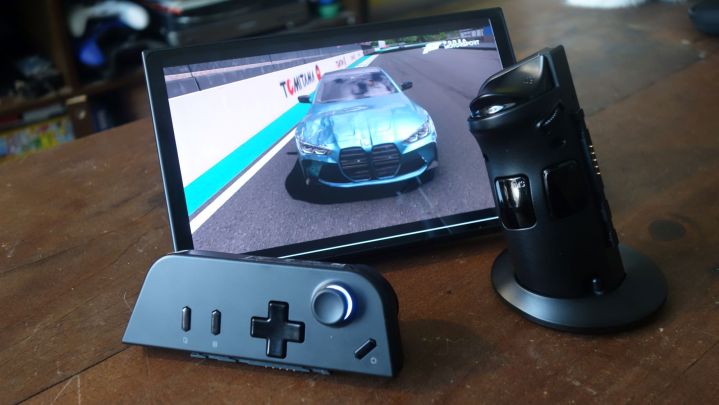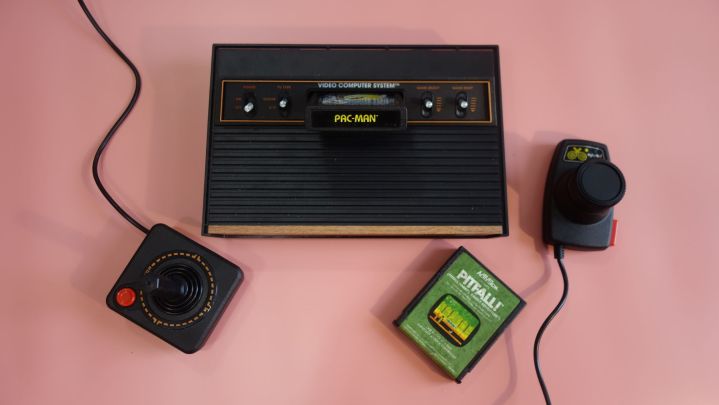
The video game hardware scene is so busy these days that it’s hard to keep track of. During November, for instance, we saw the launch of the Legion Go, Steam Deck OLED, PlayStation Portal, Atari 2600+, and a new PlayStation 5 model. It’s a whole lot to keep track of, as hardware makers find themselves in a race to innovate. A lot of those fast and furious changes are coming from the portable market, as Steam Deck competitors and cloud devices pile up.
That gave us a lot to choose from when picking the most innovative gaming tech of 2023. While the Steam Deck was the only clear choice last year, there were no shortage of directions we could have gone in this time. From groundbreaking controllers to creative handhelds, these were the pieces of hardware that moved the gaming industry forward in 2023.
Want to see the rest? Check out our full list of the most innovative tech products of 2023!
Winner: PlayStation Access Controller

While this year was filled with flashy handhelds that make gaming more flexible than ever, PlayStation delivered 2023’s most important piece of gaming tech in the PlayStation Access Controller. The unique gamepad is built with accessibility in mind, providing players with specific needs a ton of ways to customize their PlayStation experience. We’ve seen similar devices from companies like Xbox in the past, but the Access Controller takes that idea even further.
The device is a round gamepad packed with swappable parts. Players can map different buttons onto its side panels and can even mark what each pad does with erasable markers. It comes with a control stick that can swing 360 degrees around the gamepad and can be locked in place with the press of a button. It can even be attached to a second Access Controller or hooked up to other accessibility devices to give players extra flexibility. To top it off, custom profiles lets players store up to 30 configurations for easy access. It’s a fully loaded controller that aims to provide as much customization as one could hopefully need.
While we’ve yet to get hands on with it ourselves, the Access Controller takes our top innovation honors this year on principle alone. It’s always fun to toy around with new devices that let us play in new ways, but those don’t mean anything if they’re excluding players. Creative accessibility tools like the Access Controller ensure that more players will be able to experience games like Marvel’s Spider-Man 2 and Final Fantasy XVI. Sony deserves credit for not just creating a gamepad that allows that, but for also going the extra mile to create an innovative design that considers a range of needs.
Runner-up: Lenovo Legion Go

Lenovo’s Legion Go might not be the most practical portable PC on the market (the Steam Deck OLED and ROG Ally both stole its thunder this year), but it’s undoubtedly the most creative. The main selling point is that the device sports a phenomenal 1600p display with a 144Hz refresh rate. That’s the best screen for a device like this on the market today, even if it comes at the cost of performance. That’s not what makes the Legion Go special, though.
The most creative feature comes in the form of its Joy-Con-like controllers, which can be detatched from the system. By dropping one in a magnetic stand and flipping on FPS mode, players can essentially turn one controller into a mouse. There’s even a scroll wheel and extra back buttons baked into the controller to support that setup. It’s a first draft that doesn’t always work perfectly in all games, but it’s an ingenious idea that helps the Legion Go better bridge the gap between PC and handheld console. That makes it more forward-thinking than other portable PCs on the market. I expect others will try to mimic its features down the line.
Honorable mention: Atari 2600+

While there are tons of future-facing devices to shout out, from the Razer Edge to the Meta Quest 3, the retro gaming scene deserves its due when honoring innovation. Game preservation is a critical task and machines like the Analogue Pocket that make it easier to play old games deserve attention. Along those lines, the Atari 2600+ earns its honorable mention in this year’s awards even if it’s just a recreation of an old console.
What makes it special? Official retro devices like the Sega Genesis Mini 2 only tend to go so far when remaking old hardware. They shrink a console’s design down to replicate its look, but that’s more a cute gimmick than anything else. The Atari 2600+, on the other hand, is a true, working replica of its 1977 counterpart right down to its controllers. Where it really goes the extra mile is in the fact that it can actually play original 2600 cartridges like the old console could. The detail allows Atari to more faithfully preserve what it felt like to play the system in the 1970s. We rarely talk about saving physical experiences when preserving games, but Atari makes a strong case for that in the year’s finest retro system.



